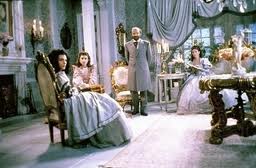
After directing "Epílogo" I was
exhausted; I was unable to gather the strength to get involved in
another project that involved such a creative risk. At the time,
different ideas crossed my mind but they didn't take a definite
shape & form. However, when I was offered to shoot "Los Pazos
de Ulloa", I soon enough saw it as a feasible project and I felt
like attempting something along the lines of "Parranda" [...]
Manuel Gutiérrez Aragón, Carmen
Rico Godoy and I have done a live adaptation of Pardo Bazán's two
novels, not exactly following what is written in its pages
strictly, but first of all assimilating their contents before
moving on to build the script [...]
Everything has been a little
surprising for me: I am at ease, the existing literary material has
had a refreshing effect on me, and in a certain sense I have had
the feeling that I have rediscovered it which has given me a
feeling of freedom, as if there wasn't a novel behind the project
[...]
I found the scenes reflecting the
local literary traditions amusing; I was very relaxed at the time;
my mind wasn't full with theoretical points of view that might
contradict what I was doing. I was fully immersed in the project
and I thought that was a good thing.
GONZALO SUÁREZ.
SYNOPSIS
In los Pazos de Ulloa, a remote and
wild location of Galicia in 1880, religión and witchcraft, passions
and politics intermingle amid nature, giving life to unforgettable
characters. Julián, a little priest whose devastating purity will
have unforeseeable consequences. The Marquis of Ulloa, the
gentleman incited to marry Nucha, a lady from the city for whom the
hostile and brutal atmosphere of los Pazos are to represent an
infernal nightmare. Sabel, the perversely beautiful maid with whom
the Marquis has had a son and whose hidden ambitions are fed by her
father - the shady administrator of los Pazos.
Humor and mystery, and the
ancestral violence that ensues, impregnate the narration, leading
us through different environments throughout four chapters, in the
last of which we will find ourselves immersed in a story of
incestuous love between Manolita, the daughter of Nucha, and
Perucho, the son of Sabel.